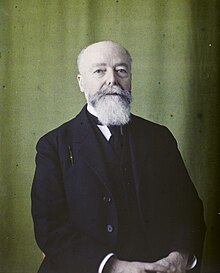Paul Doumer
Paul Doumer | |
|---|---|
Governor-General of French Indochina | |
| In office 13 February 1897 – 14 March 1902 | |
| Preceded by | Armand Rousseau |
| Succeeded by | Paul Beau |
| Personal details | |
| Born | 22 March 1857 Aurillac, France |
| Died | 7 May 1932 (aged 75) Paris, France |
| Manner of death | Assassination by gunshot |
| Political party | Independent |
| Alma mater | University of Paris |
| Signature |  |
Joseph Athanase Doumer, commonly known as Paul Doumer (French pronunciation: [pɔl dumɛːʀ]; 22 March 1857 – 7 May 1932), was President of France from June 1931 until his assassination in May 1932.
Early life
Joseph Athanase Doumer was born in
in 1877.In 1878 Doumer married
Career
From 1879 until 1883 Doumer was professor at Remiremont, before leaving on health grounds. He then became chief editor of Courrier de l'Aisne, a French regional newspaper. Initiated into Freemasonry in 1879, at "L'Union Fraternelle" lodge, he became Grand Secretary of Grand Orient de France in 1892.[2][3][4]

He made his debut in politics in 1885 as chef de cabinet to
Doumer was
With a view to annexing south Yunnan to French Indochina, Doumer successfully lobbied the French government to approve construction of the
After returning to France, Doumer was elected by Laon to the Chamber of Deputies as a Radical. He refused to support the ministry of Émile Combes, and formed a Radical dissident group, which grew in strength and eventually caused the fall of the ministry.[5] He then served as President of the Chamber from 1902 to 1905.
Doumer became Minister of Finance of France again in 1925 when
Assassination
On 6 May 1932, Paul Doumer was in Paris at the opening of a book fair at the Hôtel Salomon de Rothschild, talking to author Claude Farrère. Suddenly several shots were fired by Paul Gorguloff, a Russian émigré. Two of the shots hit Doumer, at the base of the skull and in the right armpit, and he fell to the ground. Claude Farrère wrestled with the assassin before the police arrived. Doumer was rushed to the hospital in Paris, where he died at 04:37 on 7 May. He is the only French president to die of a gunshot wound, whereas president Sadi Carnot had been assassinated through stabbing only 38 years before. Gorguloff was indicted for murder and executed by the guillotine four months later, after a swift trial.[10]
Writings
As an author he is known by his L'Indo-Chine française (1904), and Le Livre de mes fils (1906).[5]


See also
- List of finance ministers of France
- Politics of France
- Friends of the Natural History Museum Paris, of which he was one of the founders and the second president, in office from 1922 to 1931.[12]
References
- ^ Alumnus of the Conservatoire National des Arts et Métiers
- ^ Dictionnaire de la Franc-Maçonnerie, page 363 (Daniel Ligou, Presses Universitaires de France, 2006)
- ^ Dictionnaire universelle de la Franc-Maçonnerie, page 245 (Marc de Jode, Monique Cara and Jean-Marc Cara, ed. Larousse , 2011)
- ^ Histoire de la Franc-Maçonnerie française (Pierre Chevallier, ed. Fayard, 1975)
- ^ a b c One or more of the preceding sentences incorporates text from a publication now in the public domain: Chisholm, Hugh, ed. (1911). "Doumer, Paul". Encyclopædia Britannica. Vol. 8 (11th ed.). Cambridge University Press. p. 450.
- ^ Ladenburg, Thomas. "The French in Indochina" (PDF). digitalhistory.uh.edu. University of Houston. Retrieved 11 September 2015.
- S2CID 111066738.
- United Press. December 16, 1925. Retrieved 2010-11-13.
- United Press. June 14, 1931. Retrieved 2010-11-13.
- OpenEdition Journals.
- Andre Maurois, "Call No Man Happy", English translation by the Reprint Society, London, 1944, Ch. XIX, P. 221-222
- ^ Yves Laissus, "Cent ans d'histoire", 1907-2007 - Les Amis du Muséum, centennial special, September 2007, supplement to the quarterly publication Les Amis du Muséum national d'histoire naturelle, n° 230, June 2007, ISSN 1161-9104 (in French).
